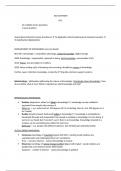Nonaka Study guides, Revision notes & Summaries
Looking for the best study guides, study notes and summaries about Nonaka? On this page you'll find 40 study documents about Nonaka.
All 40 results
Sort by
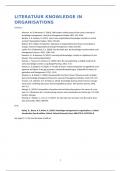
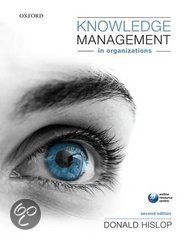 Popular
Popular
-
Literature Summary Knowledge in Organisations (Entire book + articles)
- Summary • 83 pages • 2023
-
- £7.83
- 5x sold
- + learn more
Book Hislop. Articles: - Alvesson, M. & Kärreman, D. (2001) - Baralou, E. & Tsoukas, H. - Bokeno, R.M. - Carlile, P.R. & Rebentisch, E.S. - Newman, N., & Newman, D. - Nonaka, I., Toyama, R. & Konno, N. - Pastuh, D., & Geppert, M. - Schultze, U. & Stabell, C. (2004). - Trusson, C.R., Doherty, N.F. & Hislop, D. - Wenger, E. - Fleming, P., Rhodes, C., & Yu, K. H.
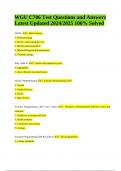
-
WGU C706 Test Questions and Answers Latest Updated 2024-2025 (100% Solved)
- Exam (elaborations) • 9 pages • 2024
- Available in package deal
-
- £13.34
- + learn more
WGU C706 Test Questions and Answers Latest Updated (100% Solved) Why AGILE? 1. shorten development cycles 2. adaptability 3. more efficient; less duplication AGILE Methodologies 1. Extreme Programming (XP) 2. Crystal 3. Unified Process 4. Scrum 5. Open Source Extreme Programming (XP) Core Values 1. Frequent communication between team and customer 2. Simplicity in design and code 3. Small iterations 4. Continuous unit testing 5. Courage Extreme Programming (XP) Key Pieces 1. Pair p...
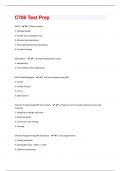
-
C706 Test Prep Questions With 100% Correct Solutions.
- Exam (elaborations) • 8 pages • 2024
- Available in package deal
-
- £6.46
- + learn more
AGILE - 1. Short releases 2. Delayed design 3. Involve users along the way 4. Minimal documentation 5. Informal/frequent documentation 6. Constant change Why AGILE? - 1. shorten development cycles 2. adaptability 3. more efficient; less duplication AGILE Methodologies - 1. Extreme Programming (XP) 2. Crystal 3. Unified Process 4. Scrum 5. Open Source Extreme Programming (XP) Core Values - 1. Frequent communication between team and customer 2. Simplicity in design and code 3. Sma...
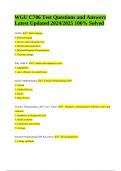
-
WGU C706 Test Questions and Answers Latest Updated 2024/2025 (100% Solved)
- Exam (elaborations) • 9 pages • 2024
- Available in package deal
-
- £13.34
- + learn more
WGU C706 Test Questions and Answers Latest Updated 2024/2025 (100% Solved) AGILE 1. Short releases 2. Delayed design 3. Involve users along the way 4. Minimal documentation 5. Informal/frequent documentation 6. Constant change Why AGILE? 1. shorten development cycles 2. adaptability 3. more efficient; less duplication AGILE Methodologies 1. Extreme Programming (XP) 2. Crystal 3. Unified Process 4. Scrum 5. Open Source Extreme Programming (XP) Core Values 1. Frequent communication b...
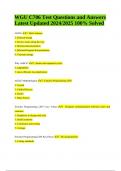
-
WGU C706 Test Questions and Answers Latest Updated 2024/2025 100% Solved
- Exam (elaborations) • 9 pages • 2024
-
- £14.15
- + learn more
WGU C706 Test Questions and Answers Latest Updated 2024/2025 100% Solved. AGILE 1. Short releases 2. Delayed design 3. Involve users along the way 4. Minimal documentation 5. Informal/frequent documentation 6. Constant change Why AGILE? 1. shorten development cycles 2. adaptability 3. more efficient; less duplication AGILE Methodologies 1. Extreme Programming (XP) 2. Crystal 3. Unified Process 4. Scrum 5. Open Source Extreme Programming (XP) Core Values 1. Frequent communication be...
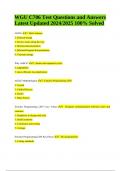
-
WGU C706 Test Questions and Answers Updated 2024/2025 (100% Verified)
- Exam (elaborations) • 9 pages • 2024
-
- £13.34
- + learn more
WGU C706 Test Questions and Answers Updated 2024/2025 (100% Verified) Why AGILE? 1. shorten development cycles 2. adaptability 3. more efficient; less duplication AGILE Methodologies 1. Extreme Programming (XP) 2. Crystal 3. Unified Process 4. Scrum 5. Open Source Extreme Programming (XP) Core Values 1. Frequent communication between team and customer 2. Simplicity in design and code 3. Small iterations 4. Continuous unit testing 5. Courage Extreme Programming (XP) Key Pieces 1. Pa...
Summary of the subject Knowledge in Organisations (KIO): MAN-BCU322A about the most dominant topics explained in the course lectures regarding the exam.
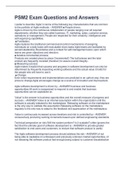
-
PSM2 Exam Questions and Answers
- Exam (elaborations) • 11 pages • 2022
-
- £8.89
- + learn more
I prefer to describe 'Agile' in terms of the following key characteristics that are common to the portfolio of Agile methods: - ANSWER ■ People driven; Agile is driven by the continuous collaboration of people ranging over all required departments; whether they are called business, IT, marketing, sales, customer service, operations or management. People are respected for their creativity, intelligence and self-organizing capabilities. ■ Facilitation; Agile replaces the traditional com...
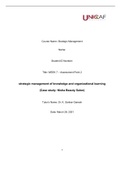
-
strategic management of knowledge and organizational learning
- Essay • 20 pages • 2021
- Available in package deal
-
- £3.41
- 1x sold
- + learn more
In this fast-forwarding business environment, organizations compete to be in the top place of their industry. According to Nonaka (1991), “advancing the knowledge is not a static endeavor” and organizational perspective is like blood in firm’s vein regarding to achieve a competitive advantage. Knowledge is, in general, one of the most precious components acquired by any organization. As a result, any leader considers learning from previous errors in order to prevent repeating them in the f...
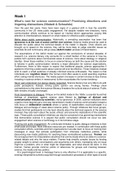
-
Summary literature Science Communication 2.0: Dialogue and Transdisciplinarity
- Summary • 24 pages • 2020
- Available in package deal
-
- £3.91
- 14x sold
- + learn more
Summary of the literature from the course 'Science Communication 2.0: Dialogue and Transdisciplinarity'. The articles summarised: Week 1: - Nisbet, M. C., & Scheufele, D. A. (2009). What's next for science communication? Promising directions and lingering distractions. American journal of botany, 96(10), 1767-1778. - Kurath, M., & Gisler, P. (2009). Informing, involving or engaging? Science communication, in the ages of atom-, bio-and nanotechnology. Public Understanding of Science, 18(5), 559-...

How did he do that? By selling his revision notes on Stuvia. Try it yourself! Discover all about earning on Stuvia



